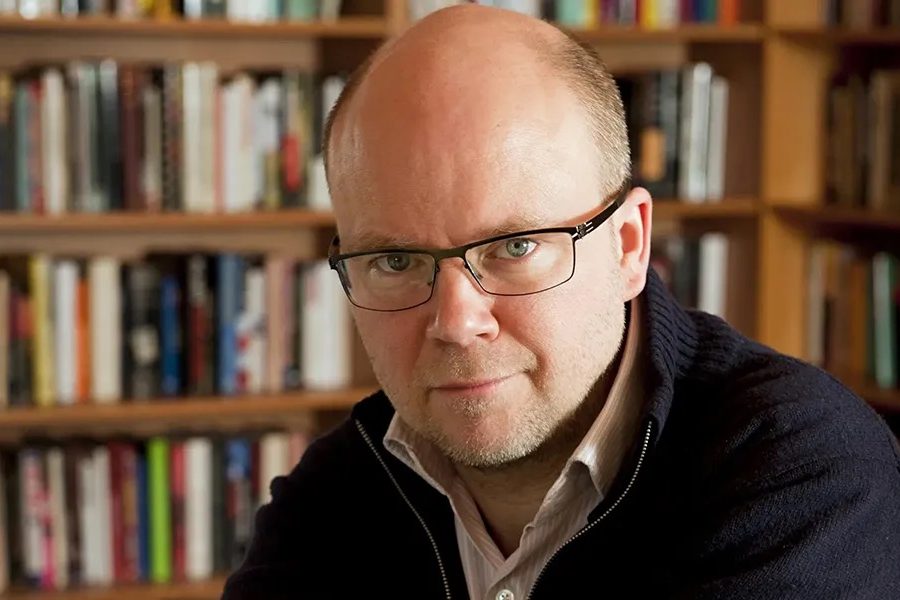The year was 1991. Actress Sean Young was trending — which in the Nineties means tabloids were dumping on her. The scandal: she barged onto the Warner Bros. lot dressed as Catwoman for an audition for Batman Returns. Two years earlier, Young was set to play Batman’s love interest in the first film, but she fell off a horse on set, fracturing her shoulder, so director Tim Burton replaced her with Kim Basinger. Young believed she deserved an audition for the sequel’s villain. After all, she was Sean Young. She played Chani in David Lynch’s original Dune (a role a not-yet-born Zendaya would reprise in a remake). She made love to future Yellowstone star Kevin Costner in No Way Out. Sure, Blade Runner flopped in its initial release, and the Wachowskis hadn’t yet cast Carrie-Anne Moss and a series of other black-haired Young lookalikes as heroines in sci-fi flicks like The Matrix, but by 1991, everyone knew Young’s role as cigarette-puffing, TERF-banged, maybe-robot Rachael was influencing a generation of blockbuster filmmakers. She was a star.
But Burton refused to see her, the media howled — and now, Hollywood was buzzing about that oh-so-difficult actress.
Publicists would tell Young to shut up (she is a woman in 1991, after all), but Young had a better solution. She went on The Joan Rivers Show and strutted across the stage in a Catwoman costume.
“How dare you not even return the Catwoman’s phone calls,” Young hissed at the camera. “Seems to me old Timmy takes himself pretty serious now, so I’m going to do you a favor and help you check into reality for a minute!”
The audience laughed. Young ripped off her cape, collapsed on a chair beside Rivers and sank back into reality. She giggled at her stunt. Decked out in a yellow pantsuit, Rivers cackled right back at her. They were two biddies poking fun at a scandal.
At least, they were for now. Halfway through the show, after a commercial break, Rivers welcomed Dr. Judy Kuriansky to the faux-living room set. The studio audience went silent. “She’s here to help us better understand much better what celebrities face when dealing with the anxiety and the stress and the agony of defeat,” Rivers explained. She turned to Dr. Kuriansky: “[Young] is putting herself on the line. Is it healthy?”
“Very!” Kuriansky said.
Young gasped, broke into tears and fell into Kuriansky’s lap. “I’ve wanted someone to say that for so long,” Young wailed. Sure, she mocked herself. Sure, she laughed. But she hurts beneath all the giggles. She’s relieved to hear someone call her normal. But, then, she paused. This couldn’t be true. She looked up, confused after too many years in La-La Land: “Why is it healthy?”
“Because [Sean] is not afraid about saying what you want and going for it,” Dr. Kuriansky said. “Sometimes you’re going to get in trouble for it.”
“Mostly, they say that I’m crazy!” Young said.
And boy did they. It’s hard to imagine now in the age of Free Britney and everyone from Paris Hilton to Pamela Anderson repositioning themselves as victims in memoirs, but Young’s career imploded. She was canceled before cancel culture existed, but many of her scandals were ahead of their time. In the Eighties, she tussled with actor James Woods before the media turned on him for his conspiracy theories. She rebuffed Harvey Weinstein’s advances years before Gwyneth. The first week of shooting Dick Tracy, she rejected Warren Beatty’s come-ons, so he allegedly fired her. (All the men deny the accusations, and Beatty has claimed he fired Young for not seeming “maternal.”) Instead of staying mum or waiting decades to recount her traumas in a Netflix documentary, Young often broadcasted the names of the men who did her wrong in real-time.
“The truth is, I took it upon myself to get pissed off about it and take it to the TV screen,” Young says. “The guys and the rest of them didn’t like that. And when you piss anybody off, there are consequences. There were consequences for me then — and I paid them.”
But Young has finally come back in the most unexpected of place, far away from Hollywood, playing B-movie star Susan Cabot in Ode to the Wasp Woman, a collection of off-off Broadway one acts about doomed film stars (think: Alfalfa from Little Rascals and Superman actor George Reeves). The play recounts how Cabot, an actress best known for her role as a giant wasp woman, gave birth to a dwarf, who murdered her after an interview with grocery store alien-and-bat boy tabloid Weekly World News went wrong. As Young’s character describes her life on stage, she was a “B-movie actor whose life was like the movies.” Or, as the George Reeves character says, she was one of many Hollywood “victims of victims.” The performance received raves in the New York Times, New York Post and more. Cindy Adams called it “an Off-Broadway renaissance.” If anyone was destined to go from playing a D-lister off-off Broadway to a Ryan Murphy vehicle, it’s Young, but she insists she ignored the positive notices: “If you don’t wanna believe the bad stuff, you can’t look at the good stuff.” It’s a lesson she learned the hard way.
I first met Young in 2017. At the time, I was a twenty-five-year-old cub reporter for a digital media outfit, and rumors were swirling across LA about Young appearing in the Blade Runner sequel. (She ended up with a short cameo.) I tracked her down. After phone calls, Facebook messages and other forms of reporter harassment, we met for lunch next to her yoga studio on a white patio at a Santa Monica restaurant that smelled like candles and gasoline. A very LA scent if there ever was one. She brought her young adult son, Quinn, along for the interview, who laughed with her and spoke throughout our lunch. For a then nineteen-year-old boy, he seemed happier to spend time with his mother than most boys his age.
Unlike her Eighties competitors — Basinger, Nicole Kidman, Daryl Hannah — she avoided plastic surgery. A few wrinkles lined her face, but she could still emote. Her old opponents might still act, but she was still beautiful.
Young was uninterested in discussing being ahead of her time. “[Now, they’d say], ‘Oh right on, girl. Stand up,’” she said. “A lot of people say, ‘I took the first selfie.’ What I regret most in my early career is that I didn’t have enough self-protective instincts. What I had was when people behaved badly, I was outraged by it. I was just kind of like, ‘What is wrong with you?’”
In other words, she’s still a talker, capable of delivering one-liners. I asked her rapid fire questions; she delivered:
On Warren Beatty: “Nightmare.”
On James Woods’s downfall: “Great!”
On barely being in the Blade Runner sequel: “Sore subject.”
On the Eighties: “Everyone was on coke, except me. Everybody was on coke. It was nasty, but it was a business.”
On agents: “The waitresses of Hollywood.”
On why she liked the Eighties: “The checks, I definitely liked making money. I don’t know that I would’ve been able to do that well in any other field. I know I would’ve made a great waitress.”
Bored or trying to manipulate me to soften her image — it’s hard to know with an actress — she turned to her son and told him to take over the interview.
It’s Young’s turn. “What’s the biggest misunderstanding about her?” I asked. She swatted a fly. “Honestly, I don’t care anymore.”
“You always had a don’t-give-a-fuck attitude,” I concluded, thinking of a YouTube video of a very pregnant Young dancing Meredith Brooks’s “Bitch” with her toddler son. They swirl across the living room, Young shaking her hips, rubbing her belly and shouting, “I’m a bitch! I’m a lover! I’m a sinner and a saint.” It’s a triumph, one of Young’s best performances. She captions the video on her YouTube channel, “Maybe we should all reconsider what our definition of a bitch is.”
But Young, to my shock, corrected me: “That’s a strong defense,” she admits. For the first time in our hour-long conversation she looks down at her lap instead of me. “It was extremely harmful — and it had a big impact.”
“What got you kicked out [of Hollywood]?” I asked.
“Maybe it was like mercury retrograde?” she said.
Perhaps it was. It definitely was for me in 2017. My story never ran. The week my article was supposed to be published, an email was leaked where I called a woman fat. My employer tossed me under the bus and fired me. A stalker doxxed me. I was a Twitter main character for a day. It was a very Sean Young ordeal, but I was shocked when she direct messaged me on Twitter about it.
“[sic] oh Mitch, I just realized you are in a press storm,” Young wrote. “I read that you got fired. I am so sorry to hear that. I hope you are doing Ok. Please let me know how you are.”
Her message was one of the ones that got me through that time. I persevered and reinvented myself, partially thanks to sage words from an OG victim of cancel culture.
Young performs Ode to the Wasp Woman in a literal temple to acting, the Actors Temple, a literal temple that doubles as a playhouse off-Broadway. The place smelled like moth balls and holy water, like a Catholic school. Paintings of rabbis lined the stairwell.
The cast prepared in a white room across from the audience bathroom in the basement. There’s no real backstage at the Temple, so Young enters the show, floating down the aisle, arms outstretched. Her early scenes revolve around preparing Cabot’s dwarf son, Zippo, for their World Daily News interview. Cabot pre-plans what they will say in the interview, down to pretending a famous actor is calling her. She’s concerned the reporter will present her as a has-been mother of a dwarf freak, even though she claims she cured his dwarfism through medical intervention.
With the wrong actress, the scene would be absurd. (You think of scribe Joe Estherzas claiming the worst received lines from his Showgirls script were the ones he cribbed from actual strippers in Vegas.) But Young makes the strange believable. As she irons a shirt for Zippo, she stares into the audience, her eyes glistening with tears. There’s a glamor but a depth to her face you don’t see in other women. (2023 Madonna would pay to look like sixty-something Sean Young.) When her character says, “everybody loves a comeback” about her World Daily News interview, she says it without irony. Young is no longer the Norma Desmond of the Eighties. She’s Gloria Swanson, making a comeback in a meta role, but she doesn’t lean into any of the meta-ness or irony. You can feel her believing every word her character says.
To prepare for the role, Young read everything she could about Cabot. Her childhood in foster care. A battle with post-traumatic stress disorder. Years in seclusion, trying to cure her son’s dwarfism before he beat her to death with a weight.
“She’s nothing like me as a person cause I’m rather positive,” Young says. “She was more traumatized. It’s a character that’s interesting, something different. However, there are parallels with the press and Hollywood.”
I thought about these parallels as I watched the play. I was sitting in a temple, watching a play, to profile Young; Cabot welcomes a Weekly World News reporter into her home for an interview. Young brought her young adult son to our first interview years ago; Cabot lives with her son. Young is amid a revival, playing Cabot; Cabot believes an interview could launch her back onto the B-list. But that’s where the similarities end. During the Weekly World News interview, Zippo interrupts, revealing it’s all staged. The journalist flees; Cabot screams at Zippo. Then, she falls into pity. She hates her son but loves him and longs for his affection. After all, she believes she cured his dwarfism. Zippo, though, thinks Cabot is smothering him, so he smothers her in a manly way, bludgeoning her to death so he can finally have peace.
Cabot is like a multiverse version of the Sean Young story where it ends poorly. Many believe the Sean Young story ended in tragedy, but through her attitude, the same I-don’t-give-a-fuck persona that got her in trouble in the first place, Young was able to find peace — a peace that, in the long run, eluded her many male opponents who now sit in jail cells or alone, canceled and out of work in Hollywood mansions. Young’s knowledge of what her life could have been adds depth to her rule. A tabloid freak story comes across as human.
Young, though, is the only cast member who could bring method acting to the temple. Most of the cast is young. Backstage, after performances, Young bonded with Payton Georgiana, a young blonde actress who played Barbara Peyton, a B-movie actress better known for her literary memoir, I Am Not Ashamed.
One night, Georgiana asked Young for advice.
“As a young, beautiful actress, develop boundaries because what happens when you’re young and you’re beautiful is people aren’t necessarily that nice to you,” Young says. “My biggest advice would be shut up. Shut up. You don’t help yourself. Just relax, baby.”
Young seems more relaxed than ever. After the play’s run ended, Young called me, as she merged on the turnpike, headed from New York to Philly. I had avoided asking her about Catwoman — it seemed like more of a sore subject than Blade Runner: 2049 — but given it would probably be our last call, it seemed like a time to ask.
“When you went on Joan Rivers, was that an act of rebellion, or did you feel like you were suffering?”
“Honestly, I thought it was funny!” she said. “I thought it was really, really funny, but these, these insecure dickheads at these studios, they just didn’t see the humor. they really didn’t. And I did not realize that that they were so humorless. I really didn’t. I thought it was absolutely fucking hilarious. I love that video. Of course, I should play Catwoman, and if these guys had had any sense, any time from that point until now, they would have given me the part again because [the controversy], it was so perfect, but they’re not really good businessmen… They’re not very intelligent.”
Given the controversy, Catwoman would have been the best role for her. (Lord knows, the struggling DC Cinematic Universe could use some press.) But she still got to use the controversy all these years later. In Ode to the Wasp Woman, her trauma — as she called her fame in People magazine — was put to use.
Young is a survivor with lessons to share. She’s taught me some myself. Towards the end of our call, I thank her for the direct message she sent me in 2017, but she doesn’t even remember it. She laughs. “Forgive me because this is one of the reasons why I survive: I don’t sweat the small stuff.”























Leave a Reply